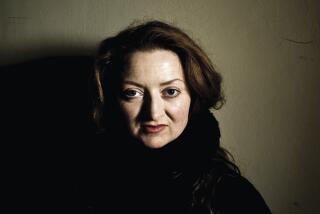Marina Keegan: A Yale graduate’s life cut short
- Share via
News briefs can be cruel. Not because of what they say, but because of what they don’t.
The Boston Globe ran an item Saturday headlined “Wayland woman dies in Dennis car crash.” It was breaking news, but not unusual. The Globe’s metro desk regularly runs tragedies in brief: struck pedestrian, fatal motorcycle accident.
This one told of Marina Keegan, 22, who died when the car she was riding in drifted off the road, hit a guardrail, veered back over the road and rolled over at least twice. The driver of the 1997 Lexus ES300 survived.
The accident backed up traffic for nearly a mile, the Globe noted. This was the news.
What the Globe didn’t mention, what wasn’t news at the time, was that Keegan was a writer. A pretty good one. She had just graduated from Yale University. And one of the last things she ever wrote was about the importance of living life to its fullest.
“We don’t have a word for the opposite of loneliness, but if we did, I could say that’s what I want in life,” Keegan wrote in an essay for her commencement, which the Yale Daily News posted online Sunday after her death and which has already been spread widely. The opposite of loneliness, Keegan wrote, is “what I’m grateful and thankful to have found at Yale, and what I’m scared of losing when we wake up tomorrow and leave this place.”
Her final column is about aspirations.
“What we have to remember is that we can still do anything,” she wrote. “We can change our minds. We can start over. Get a post-bac or try writing for the first time. The notion that it’s too late to do anything is comical. It’s hilarious. We’re graduating college. We’re so young. We can’t, we MUST not lose this sense of possibility because in the end, it’s all we have.”
All she had.
“Rest in Peace, Marina,” a commenter wrote beneath the column. “My deepest condolences to her family and friends.”
“What a cruel turn of events,” another added. “I only knew you through your byline and through mutual friends, but through them, you showed yourself as one of the most beautiful people I’ve ever had the privilege to know.”
Writers, when they get good enough, get published enough, start to live their lives in public because of the nature of their work. Keegan was already living such a visible life — she was the president of Yale College Democrats, a member of Occupy Yale and an occasional contributor of fiction and opinion pieces to the Yale Daily News.
She’d also been blogging for the New Yorker, where she was headed after graduation to be an editorial assistant. She’d also had a piece in the New York Times about a college recruiting session with a hedge fund in which she “got this uneasy feeling that the man in the beautiful suit was going to take my Hopes and Dreams back to some lab to figure out the best way to crush them.”
Yep. An English major for sure.
From her columns, you can discover that she hated Harvard the way most Yale kids hate Harvard, that she was bummed she didn’t get into a secret society, and that she thought pot should be legalized. She also wrote fiction.
Maybe it’s a historical anomaly that her work has outlasted her. She was not particularly impressed by this concept of things outliving other things. In a previous column, she wrote about the end of the universe. “Soon enough, the books we write and the plants we grow will freeze up and rot in the darkness,” she wrote. “But maybe there’s hope.”
It’s a funny thing to think about hope while standing, mentally, at the end of the universe. She did seem to write about mortality a lot. And the world. And the end of it.
But like a good writer, she made a little magic of it. Maybe we don’t have to be so torn to think that Marina Keegan has been lost before her time when it seems that she’d been making the best of what she had. That news brief in the Boston Globe can’t be cruel for what it left out, because Marina Keegan’s writing had begun filling the gaps.
“I read somewhere that radio waves just keep traveling outwards, flying into the universe with eternal vibrations,” she wrote on the 10th anniversary of Sept. 11, in closing her column.
“Sometime before I die I think I’ll find a microphone and climb to the top of a radio tower,” she continued. “I’ll take a deep breath and close my eyes because it will start to rain right when I reach the top.
“Hello, I’ll say to outer space, this is my card.”
It reads Marina Keegan, Class of 2012.
ALSO:
Oregon marriage proposal goes viral on YouTube
Florida police kill naked man as he chews on another man’s face
Etan Patz case, and what it means for parents of missing children
More to Read
Sign up for Essential California
The most important California stories and recommendations in your inbox every morning.
You may occasionally receive promotional content from the Los Angeles Times.











